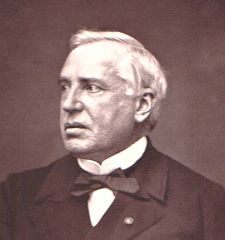
Auguste Nélaton
Encyclopedia

France
The French Republic , The French Republic , The French Republic , (commonly known as France , is a unitary semi-presidential republic in Western Europe with several overseas territories and islands located on other continents and in the Indian, Pacific, and Atlantic oceans. Metropolitan France...
physician
Physician
A physician is a health care provider who practices the profession of medicine, which is concerned with promoting, maintaining or restoring human health through the study, diagnosis, and treatment of disease, injury and other physical and mental impairments...
and surgeon
Surgery
Surgery is an ancient medical specialty that uses operative manual and instrumental techniques on a patient to investigate and/or treat a pathological condition such as disease or injury, or to help improve bodily function or appearance.An act of performing surgery may be called a surgical...
. Born at Paris
Paris
Paris is the capital and largest city in France, situated on the river Seine, in northern France, at the heart of the Île-de-France region...
, he began studying medicine
Medicine
Medicine is the science and art of healing. It encompasses a variety of health care practices evolved to maintain and restore health by the prevention and treatment of illness....
in 1828 and was graduated as an M.D.
Doctor of Medicine
Doctor of Medicine is a doctoral degree for physicians. The degree is granted by medical schools...
in 1836 with a thesis on the effects of tuberculosis
Tuberculosis
Tuberculosis, MTB, or TB is a common, and in many cases lethal, infectious disease caused by various strains of mycobacteria, usually Mycobacterium tuberculosis. Tuberculosis usually attacks the lungs but can also affect other parts of the body...
on the bone
Bone
Bones are rigid organs that constitute part of the endoskeleton of vertebrates. They support, and protect the various organs of the body, produce red and white blood cells and store minerals. Bone tissue is a type of dense connective tissue...
s. Three years later, he became a professor at the Hôpital St. Louis with a habilitation on breast tumors. From 1851 to 1867, he was a full professor, a post he abandoned when he became the personal surgeon of Napoleon III. Ramón Emeterio Betances
Ramón Emeterio Betances
Ramón Emeterio Betances y Alacán was a Puerto Rican nationalist. He was the primary instigator of the Grito de Lares revolution, and as such, is considered to be the father of the Puerto Rican independence movement...
—Puerto Rican
Puerto Rico
Puerto Rico , officially the Commonwealth of Puerto Rico , is an unincorporated territory of the United States, located in the northeastern Caribbean, east of the Dominican Republic and west of both the United States Virgin Islands and the British Virgin Islands.Puerto Rico comprises an...
pro-independence leader, surgeon and Légion d'honneur
Légion d'honneur
The Legion of Honour, or in full the National Order of the Legion of Honour is a French order established by Napoleon Bonaparte, First Consul of the Consulat which succeeded to the First Republic, on 19 May 1802...
laureate—was one of Nélaton's prominent students. In 1868, he was appointed Imperial Senator.
Nélaton worked in plastic surgery
Plastic surgery
Plastic surgery is a medical specialty concerned with the correction or restoration of form and function. Though cosmetic or aesthetic surgery is the best-known kind of plastic surgery, most plastic surgery is not cosmetic: plastic surgery includes many types of reconstructive surgery, hand...
. He was the first to re-emphasize ligature
Ligature (medicine)
In surgery or medical procedure, a ligature consists of a piece of thread tied around an anatomical structure, usually a blood vessel or another hollow structure to shut it off. With a blood vessel the surgeon will clamp the vessel perpendicular to the axis of the artery or vein with a hemostat,...
of the two ends of arteries in hemorrhages first promoted by Ambroise Pare in the mid 1500s, invented the porcelain-knobbed probe for locating bullets known as Nélaton's probe, and made noted contributions to pelvic and abdominal surgery
Surgery
Surgery is an ancient medical specialty that uses operative manual and instrumental techniques on a patient to investigate and/or treat a pathological condition such as disease or injury, or to help improve bodily function or appearance.An act of performing surgery may be called a surgical...
.
In 1867, he was elected a foreign member of the Royal Swedish Academy of Sciences
Royal Swedish Academy of Sciences
The Royal Swedish Academy of Sciences or Kungliga Vetenskapsakademien is one of the Royal Academies of Sweden. The Academy is an independent, non-governmental scientific organization which acts to promote the sciences, primarily the natural sciences and mathematics.The Academy was founded on 2...
.

